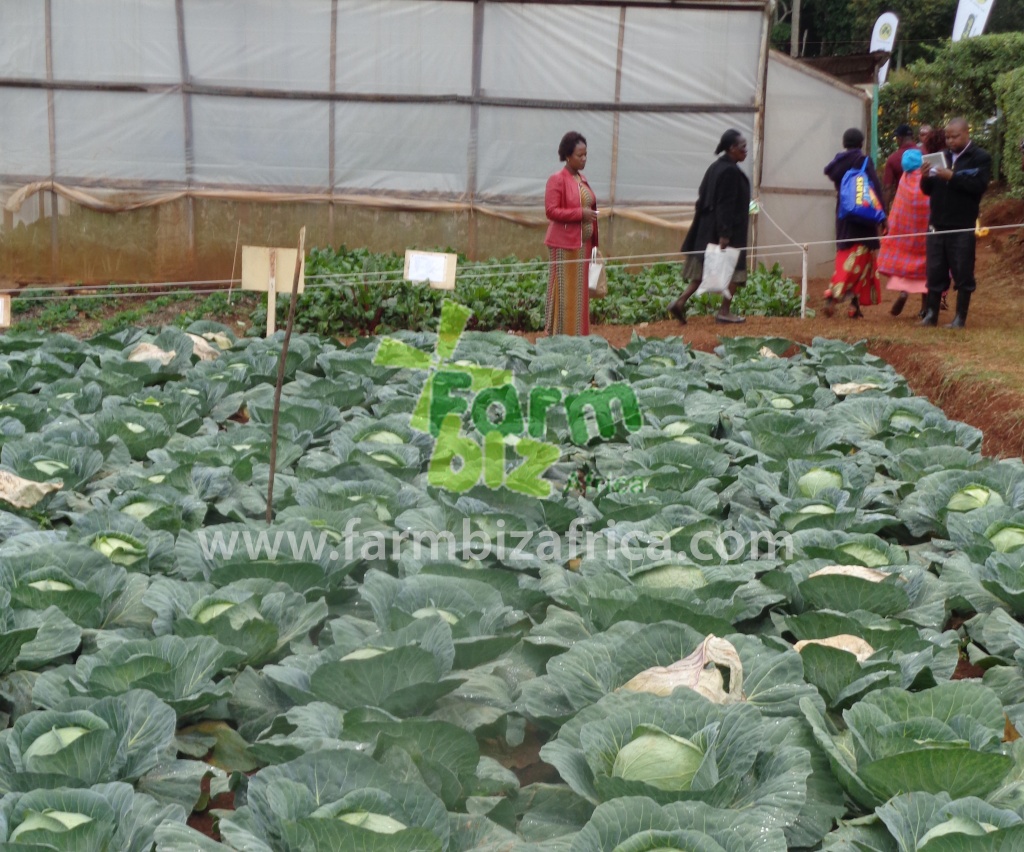By Boaz Keizire
As world heads of state met at the United Nations General Assembly (UNGA) last month, Africa was represented by several presidents, among them Ethiopia’s Prime Minister Hailemariam Desalegn, Zambia’s Edgar Lungu and Rwanda’s Paul Kagame.
I was there too.
The rest of the world had its eyes on Donald Trump, Bill Gates and Angela Merkel leading several institutional and state presidents to an event that had great political import following Mr. Trump’s earlier dismissal of the UN.
But, amidst all the tension and accompanying political undertones, the African leaders nonetheless pulled away from the drama of the main assembly to hold a side-meeting, to which Mr. Gates was also invited, to engage on the state of agriculture in Africa.

Quuen F1 Cabbage variety at the 2017 Nyeri Agricultural Society of Kenya Show. PHOTO/JAPHET RUTO
READ ALSO: African agriculture: who will own the future?
In its own ‘back room’ way, far from the cameras and eyes of the media, that African side meeting at the UNGA was ground breaking, as the heads of state supported a measurement tool to achieve accountability in making the policy and many other changes, including investment, to stimulate the continent’s agricultural sector.
The potential for agriculture to usher in a wealthier future for Africa is enormous, but for an industry that is dominated by small holders, it requires the mending of filling of multiple gaps, all of which are making it harder for our continent’s farmers and agripreneurs to draw the full potential from our vast lands.
But for the heads of state to speak to the merits of measurement, country by country, and government accountability in delivering an agricultural transformation was a moment that I, personally, shall never forget. For me, it represents a milestone that many of us have worked long and hard for.
READ ALSO: Measuring Africa’s agricultural takeoff is set to make billionaires, from ‘poor men’s fields’
The agricultural scorecard idea was first mooted at the 2014 African Union Heads of State Summit in Equatorial Guinea, where African leaders agreed to a common set of targets for agricultural development and to a biennial review of progress made against these goals: in a commitment now popularly known as the Malabo Declaration.
The African Union Commission and the NEPAD Agency have been leading the review process through the collection of data on a set of 43 indicators from its 55 member countries.
With the findings of this first biennial review now set for presentation at the African Union heads of state summit in January next year, it was a wholly new experience, too, to hear Gates, one of the non-state world leaders and philanthropists at the meeting, comment on the enthusiasm for the scorecard concept, as he encouraged participants to move quickly to take advantage of the momentum created to secure support for the tool.
“I am really enthused about the call for a scorecard, as it can be very catalytic,” said Gates.
Gates’ sentiments were supported by businessman Dr. Strive Masiyiwa, who recommended quantitative tracking as a way for monitoring progress and encouraging best practices.
The agricultural scorecard draws its inspiration from the success of similar tools, like the African Leaders Malaria Alliance (ALMA) Scorecard for Accountability and Action, which have seen countries across the continent act to eradicate the disease from the continent by 2020.
READ ALSO: Major Deals to Accelerate Africa's Path to Prosperity through Agriculture Agreed
Between 2011, when the first ALMA scorecard was released, and 2015, some eight countries, including Cape Verde, Uganda and Ethiopia, reported a reduction in malaria incidence of 40 per cent or more, in a drop that has, in part, been attributed to the accountability framework that has been provided by the ALMA scorecard.
Kenya’s Cabinet Secretary for Foreign Affairs, Amina Mohammed, who sat in for President Uhuru Kenyatta at the UNGA side-meeting, expressed her pleasure at seeing resources being channeled towards the creation of a similar tool for agriculture, indicating that it holds the promise of improving the state of the sector across the continent, “just like the ALMA scorecard helped ramp up efforts in the fight against malaria”.
AGRA president, Dr. Agnes Kalibata, one of the leaders that have been spearheading the development of the scorecard, also knows too well the importance of the accountability tool, which she hopes will, “build on and from the Biennial Review, but be designed for and by Heads of State to track progress and share best practices”.
Overall, the agriculture sector received significant attention throughout the five-day UNGA with many speakers declaring it as the shinning hope of revival for a continent that has long held the promise of world leadership in food production.
Anne Désirée Ouloto, the Minister of the Environment and Sustainable Development of Côte d'Ivoire, affirmed that the West African country’s outstanding GDP growth continues to be driven by agriculture, with agricultural transformation at the centre of its strategy for overall structural transformation.
Ethiopia’s Prime Minister, Desalegn, also emphasised the importance of agriculture for economic growth and development in Africa, highlighting the need for new policies and investments to transform the sector.
“Agriculture has been a key driver for Ethiopia, and has made it among the fastest growing economies in Africa,” he said.
The response by various Heads of State and other world leaders to the prospects of a high-level agricultural scorecard now confirms that Africa is indeed ready for the second revolution, one which will emanate from our farm lands.
Boaz is a Head of Policy and Advocacy at AGRA and also a 2017 Fellow for the Aspen New Voices Fellowship
















Comments powered by CComment